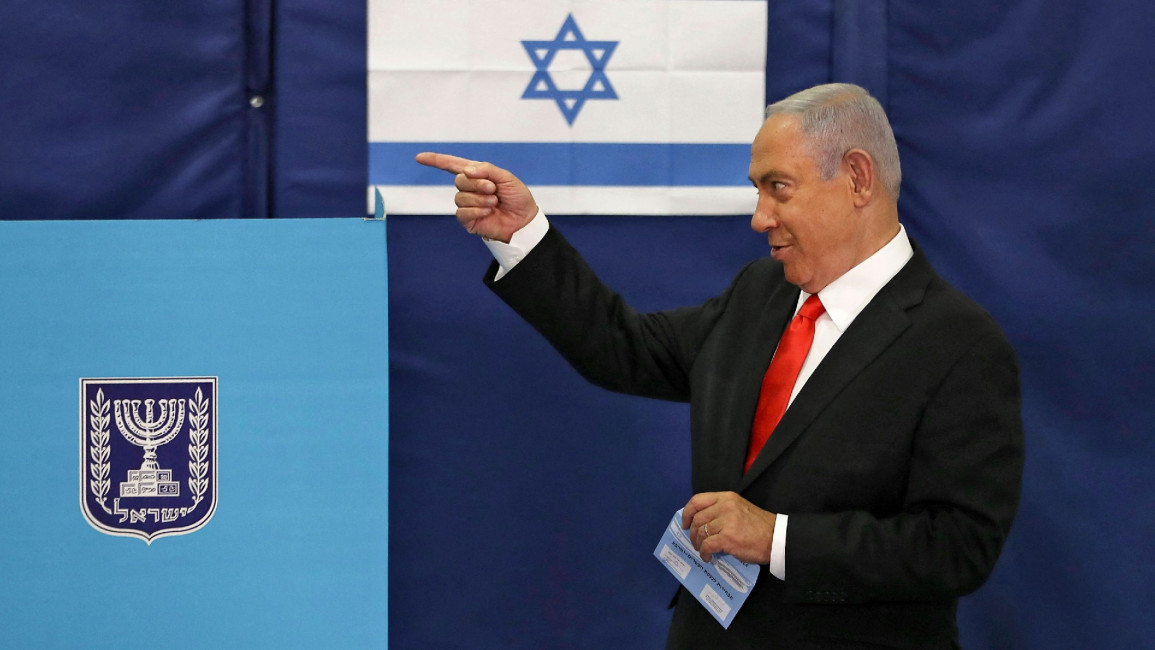Netanyahu in lead but majority uncertain after Israel vote
Israeli Prime Minister Benjamin Netanyahu's Likud party was on track Tuesday to win the most seats in the country's fourth election in two years, but with no guarantee it can form a governing majority.
The projections based on exit polls that are subject to change indicate that Netanyahu's former protege and ex-defence minister Naftali Bennett will be able to play kingmaker.
Bennett's relations with Netanyahu have grown strained but if the former allies come to terms it could give the prime minister the right-wing coalition government that has eluded him for years.
Exit polls from Israel's three main broadcasters have given Likud between 31 and 33 seats, far outpacing its closest challenger, the centrist Yesh Atid party projected to win between 16 and 18 seats.
Likud's tally, along with the seats projected to have been won by its religious right-wing allies, indicate the solidly pro-Netanyahu bloc has won 53 or 54 seats.
A majority in Israel's 120-member parliament, the Knesset, requires 61 seats.
The anti-Netanyahu bloc was on track to win 54 seats, the surveys showed.
Bennett leads the religious nationalist Yamina party, which is projected to win between seven or eights seats.
The multi-millionaire former tech entrepreneur appears able to push Netanyahu over the line.
He has not ruled sitting in anti-Netanyahu coalition, while saying he was open to joining Netanyahu.
|
"I will do only what is good for Israel," Bennett's office said in a statement after the projections were released.
'Gridlock'
Netanyahu, 71, is Israel's longest-serving premier but his inability to unite a stable governing majority behind him has mired the country in political gridlock.
He campaigned on a coronavirus vaccination campaign that has seen nearly half of Israel's nine million people fully inoculated against the virus.
Election day saw a rocket fired from Gaza at Beersheba a short while after Netanyahu visited the southern city.
The army said "a projectile was fired from the Gaza Strip into Israeli territory," with a spokeswoman saying a rocket hit an open field.
There were no immediate reports of damage or injuries.
Corruption trial
Netanyahu is on trial over corruption charges - allegations he denies, but which have helped fuel a protest movement with weekly rallies outside his Jerusalem residence.
The premier has said he will not block the trial and looks forward to being exonerated, but critics suspect that if he forms a majority, he may seek parliamentary action to delay or end the process.
Based on the exit polls, a Netanyahu coalition will require alignment with a new far-right extremist alliance called Religious Zionism, which is projected to win between six and seven seats.
That means the bloc will send to parliament Itamar Ben-Gvir, who has voiced admiration for the mass-murderer of 29 Palestinian worshippers in Hebron in 1994, Baruch Goldstein.
"If Bennett joins his coalition, Netanyahu is closer than ever to a narrow government including the most extreme elements of Israeli society," Yohanan Plesner, president of the Israel Democracy Institute think-tank, said after the provisional results were released.
Fifth vote?
Tuesday's vote was forced on Israelis after Netanyahu triggered the collapse of a unity government he had formed with former military chief Benny Gantz, his main challenger in three previous, inconclusive elections.
Gantz, punished by supporters for joining Netanyahu, said he only did so to give Israel stability amid the pandemic.
But their agreement called for Netanyahu to hand power to Gantz after 18 months, something observers correctly predicted he would never do.
If Netanyahu can't reach a deal with Bennett and his opponents cannot unite a fifth election is possible.
Political analyst Gideon Rahat said that may suit Netanyahu, whose primary objective is to stay in power - if necessary as a caretaker premier awaiting yet another round.
Netanyahu "can easily go to a fifth, sixth or seventh election", Rahat said.



